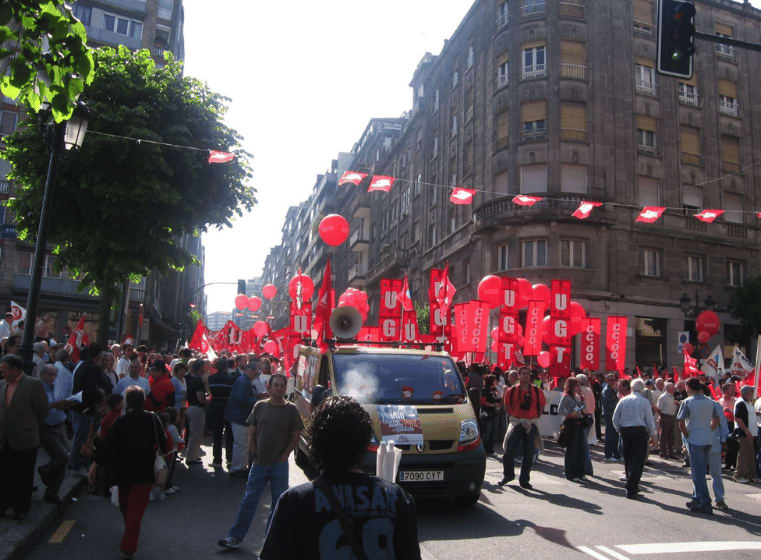Labor Day: A Very Special Day for Working Spaniards!
December 9, 2022
Win a FREE Trip to Spain!
Exciting Announcement! For the first time, we're thrilled to offer exclusive trips to the heart of Spain - an experience like no other. This isn't your typical tourist journey; it's a unique opportunity to immerse yourself in authentic Spanish culture, alongside real locals and our passionate team.
But there's more! Simply by requesting information about this amazing trip, you'll be entered into a special draw to win a Fully Paid Trip to Spain for Two. And that's not all - everyone who inquires will receive an exclusive bonus gift, valued at $500, available only now.
Ready to Discover the Real Spain?Click Here ↑ to Request Information & Enter the Draw!
No work on Labor Day? Witness how Spaniards honor and commemorate the martyrs of Chicago and the significant achievements for workers’ rights in this article!
I’ll explain the origin of this celebration, the countries implied, and how this day is observed in Spain. You’ll be surprised to learn that most of our rights as workers today are thanks to people who risked their lives before for us to have them.
It is essential that beyond saying, “tomorrow is a holiday in Spain,” we understand why there is a day of rest on this national holiday in the first place. And, most importantly**, learn who and what achievements should be honored and valued on these dates.**
Okay, I already told you enough. Let’s save some information for later and prepare for some curious facts about Labor Day I bet you didn’t know before!
Table of Contents ▼ ▶
When is Labor Day Celebrated in Spain?

Labor Day or Workers’ Day is commemorated every May 1 in Spain. It is a national holiday commemorating social progress. It is considered a mandatory resting day for all Spaniards to live a day of retribution for labor and the social rights of the workers’ movement.
Why is Labor Day Celebrated?
The origin and roots of labor day go back to the 19th century. It was a time of industrial and economic progress, but with a significant downside: workers were subjected to endless working hours of twelve, fourteen hours, or even more! And the eight-hour day became one of the main demands of the labor movement.
In all countries, the proletariat demanded 8 hours for work, 8 for rest, and 8 for leisure. Here is when the strikes began. On May 1, 1890, there was a manifestation of proletarians in the United States and also in Europe’s most advanced countries. As the protest was a resounding success, various governments were forced to consider these inquiries.
Later, the Haymarket incident took place. On May 4, anarchist groups outraged by police violence called for a demonstration in Haymarket Square, the commercial heart of Chicago. At this location, a bomb was thrown into a Chicago rally, killing seven police officers. Eight anarchists were convicted for these events, and five were executed. Since then, they became the Chicago Martyrs.
In memory of the “martyrs of Chicago” and to honor the struggle for the 8-hour workday, International Workers’ Day was declared on May 1, 1889, by the General Workers’ Union of the Second International at a conference in Paris.
How did Labor Day arrive in Spain?
Labor Day began to be celebrated in Spain in 1889. On that first Worker’s Day, two rallies took place in Madrid, the capital city of Spain. One protest was socialist, and the other one was anarchist —Both without incidents—However, in other regions such as the Basque Country, Valencia, and Barcelona, acts of violence occurred and forced the banning of the demonstration the following year.
The festive character of Workers Day came years later to the country. During the Second Republic, the Minister of Labor, Largo Caballero, declared May 1 as a national holiday in 1931. But it did not last long. In March 1938, Franco substituted Labor Day for the “Exaltation of Labor Day,” considering that the former had been established by his “enemies,” the socialists and communists. During this time, May Day ceased to be a day of retribution for the workers and became an “honor” day for the business people.
Labor Day was finally legalized in Spain in 1978 with the help of the labor movement. Since then, it has been the perfect instrument for alliances to emphasize the needs of Spanish employees.
Since then, workers have achieved contractual rights and recognized benefits by labor legislation, those rights and benefits are the following:
- The reduction of the working day to 8 hours.
- Social Security for workers: Insurance against Illness, Occupational Accidents, Disability, and Old Age.
- Wage equality.
- Right to minimum wage.
- Enjoyment of vacations.
- Bonuses.
- Payment of holidays.
- Right to union association.
- Right to strike.

How is Labor Day celebrated in Spain?
Spain celebrates labor day with public rallies and marches that take place on this day in favor of workers’ rights and labor demands. The day’s events are organized mainly by the unions’ presidents, members of the different workers’ groups, as well as the main actors of the political parties.

There is no work on Labor Day in Spain since it is a National Holiday. During this day, centers such as malls, supermarkets, and all kinds of stores remain closed, while the only exceptions will be restaurants, pubs, cinemas, theaters, and entertainment centers.
If you’re wondering how to honor and celebrate Labor Day, you can support a workers’ rally to demand improvements in working conditions, considering that every city has its own parades and events. You should contact unions or any workers’ association if you want to be part of any of them next May 1.
5 Curious Facts About Labor Day in Spain
- Most protestors were Italian, Spanish, German, Irish, Russian, and Polish immigrants in the protest of May 1, 1986.
- The word “salary” comes from the Latin “salarium,” which means “payment of salt” or “for salt.” It was common to pay soldiers with salt in the Roman Empire since this ingredient was precious at that time because it allowed meat preservation.
- The minimum wage was introduced in Spain in 1963.
- If you’re curious on how much do people make in Spain, here’s the answer:

- The average employed Spaniards worked 38.4 hours per week, while women worked 33.3 hours per week in 2021, according to the National Institute of Statistics. Still, Spaniards have a strong reputation for being lazy. Is this true? How many hours do Spaniards work compared to other European Countries? Are they productive? Find out all in the following articles:
After work in Spain: A Unique Way to End Your Work Day
Are the Spanish Good Workers? Working hard or Hardly Working
- Although the tragedy occurred in the United States, Labor Day is not celebrated on May 1. They commemorate Workers’ Day on the first Monday in September, along with Canada. Other countries that do not commemorate this international day are New Zealand, Australia, and Japan, which have another date.
As you can see, this day is very important for Spain, and its relevance is understood internationally. It is true that the workers of that time have left a huge legacy to the following generations and have given rise to communities and entities that watch over the rights of workers that many times are exploited by companies that only care about profit.
Beyond honoring and respecting this day, our job is to oppose the injustices we see in our working environment to preserve people’s rights.












